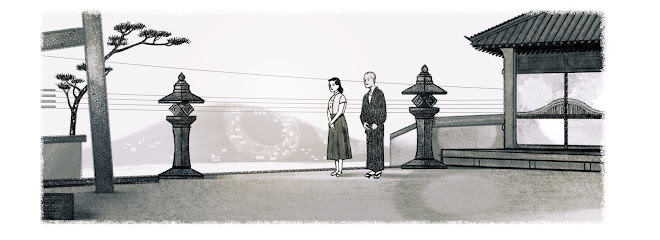Yasujiro Ozu: A Japanese Filmmaker’s Timeless Oeuvre

Yasujiro Ozu (December 12, 1903 – December 12, 1963) was a visionary Japanese filmmaker who significantly contributed to the world of cinema. His unique storytelling style and focus on intimate family dramas have left an enduring impact on film history.
Life & Career
Yasujiro Ozu was born in Tokyo on December 12, 1903. His early life laid the foundation for his cinematic journey. Ozu’s formal education included studying film at Waseda University, setting the stage for his illustrious career. Ozu’s career unfolded during a transformative period in Japanese history. His filmography is marked by a departure from traditional storytelling, emphasizing quiet observations and familial intricacies. Notable works like “Tokyo Story” and “Late Spring” showcase his mastery in portraying the subtle complexities of human relationships. In 1920, at the age of 17, he was thrown out of the dormitory after being accused of writing a love letter to a good-looking boy in a lower class, and had to commute to school by train.
During the 1920s and 1930s, Ozu’s filmmaking style evolved, incorporating elements of traditional Japanese aesthetics. His emphasis on everyday life and the evolving roles within families resonated with audiences, earning him acclaim both domestically and internationally.
Awards & Legacy
Yasujiro Ozu’s legacy extends far beyond his time. His films, often characterized by their simplicity and profound emotional impact, have influenced generations of filmmakers worldwide. Ozu’s thematic focus on societal changes and generational shifts solidifies his place as a cinematic maestro. Despite facing challenges in gaining recognition during his lifetime, Ozu’s work has endured and gained appreciation posthumously. His influence is evident in the works of renowned directors like Yasujiro Ozu and Hou Hsiao-hsien. Ozu’s impact on Japanese cinema is immeasurable, and his legacy continues to grow. The enduring relevance of his films, exploring the intricacies of family life and societal norms, has established him as a revered figure in world cinema.
While Ozu did not receive widespread acclaim during his lifetime, his posthumous recognition is a testament to the timeless quality of his films. The enduring appeal of “Tokyo Story” and “Late Spring” has led to retrospectives and tributes at prestigious film festivals worldwide. In recent years, Ozu’s contributions to cinema have been celebrated through retrospectives, highlighting the significance of his work in shaping the language of filmmaking. Although he did not receive many awards during his lifetime, his films have garnered critical acclaim, and his influence is acknowledged in the annals of cinema history. Yasujiro Ozu’s life and career illuminate the transformative power of storytelling in cinema. His legacy persists through the enduring relevance of his films, enriching the tapestry of world cinema with timeless tales of human connection and societal evolution.
On 12 December 2013, a Google Doodle was created to celebrate Yasujiro Ozu’s 110th Birthday.
Observer Voice is the one stop site for National, International news, Sports, Editor’s Choice, Art/culture contents, Quotes and much more. We also cover historical contents. Historical contents includes World History, Indian History, and what happened today. The website also covers Entertainment across the India and World.

